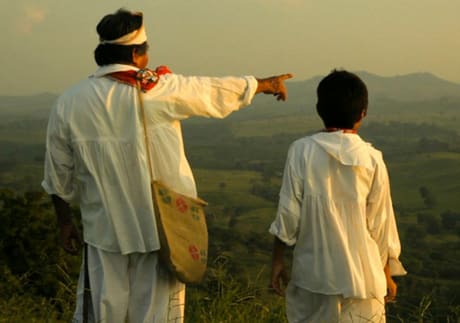Using a highly stylized, albeit subdued and non-invasive, approach to depicting his documentary subject, Mexican director José Álvarez has crafted a thoughtful and contemplative ethnographic study of Canícula, the a 40-day ceremonial season in the Totonac community of Zopotal-Santa Cruz, Mexico.
A minimalist soundtrack and limited dialogue only hint at a guiding trajectory as we witness the quotidian experience of a cultural subsection. The women of the community work with the Earth, aiding plant life and the growth of food sources, manipulating clay to make ceramics and pots. As they work together, living off the land, the men prepare a free-falling, "flying men" act as a spiritual offering to the deceased and sustained survival.
These preparations are filmed with an intimacy that avoids external contextualizing or mirroring for broader audience connection or appreciation. Álvarez is more interested in capturing these moments as they are without asserting an unnecessary agenda, instead focusing on the lyrical momentum of his film to make visually melodic the experience of witnessing a way of life.
As such, watching Canícula is an experience unto itself. It demands patience and investment in the feeling of a narrative as opposed to a traditional expository approach. And while this limits the audience to cinephiles, artist types, or anyone under the influence of narcotics, there is something moving and risky about taking a sensory approach to documenting a culture tied so closely to the land they live off.
Moreover, the terrifying, albeit seemingly effortless, Danza de los Voladores, wherein someone spins unsupported atop a tall manmade tower while others dangling below, twirling slowly to the ground, is stunning to behold. Beautifully shot and thoughtful in execution, this humble documentary succeeds in its aims wholeheartedly.
(Alacran Con Alas)A minimalist soundtrack and limited dialogue only hint at a guiding trajectory as we witness the quotidian experience of a cultural subsection. The women of the community work with the Earth, aiding plant life and the growth of food sources, manipulating clay to make ceramics and pots. As they work together, living off the land, the men prepare a free-falling, "flying men" act as a spiritual offering to the deceased and sustained survival.
These preparations are filmed with an intimacy that avoids external contextualizing or mirroring for broader audience connection or appreciation. Álvarez is more interested in capturing these moments as they are without asserting an unnecessary agenda, instead focusing on the lyrical momentum of his film to make visually melodic the experience of witnessing a way of life.
As such, watching Canícula is an experience unto itself. It demands patience and investment in the feeling of a narrative as opposed to a traditional expository approach. And while this limits the audience to cinephiles, artist types, or anyone under the influence of narcotics, there is something moving and risky about taking a sensory approach to documenting a culture tied so closely to the land they live off.
Moreover, the terrifying, albeit seemingly effortless, Danza de los Voladores, wherein someone spins unsupported atop a tall manmade tower while others dangling below, twirling slowly to the ground, is stunning to behold. Beautifully shot and thoughtful in execution, this humble documentary succeeds in its aims wholeheartedly.
